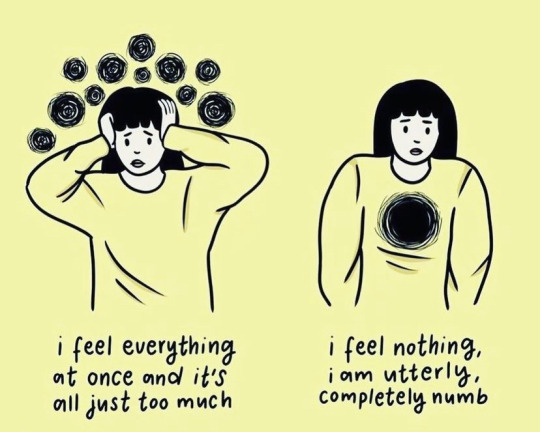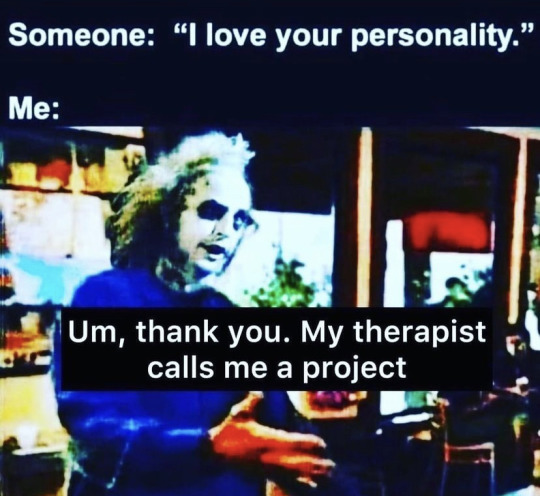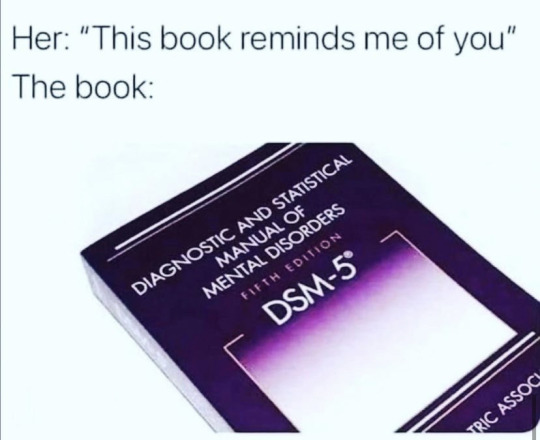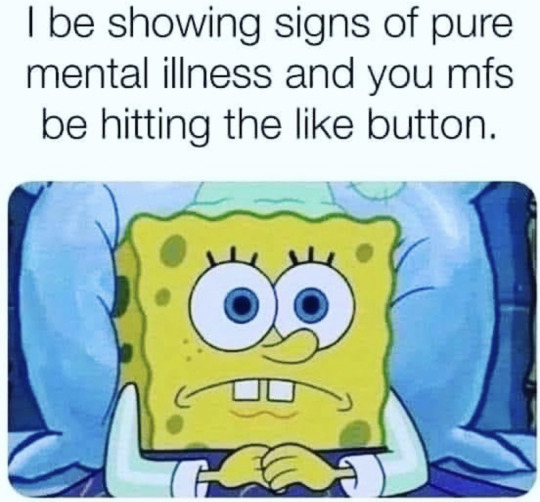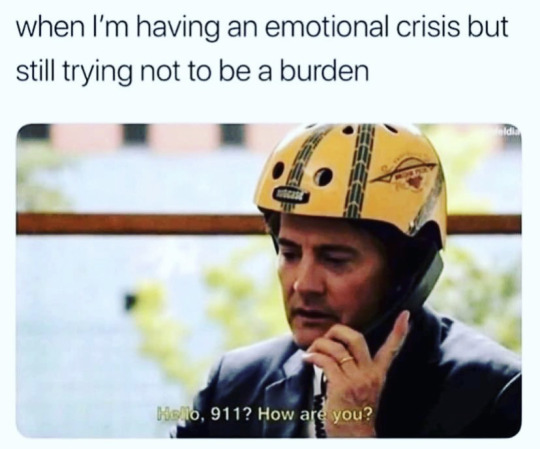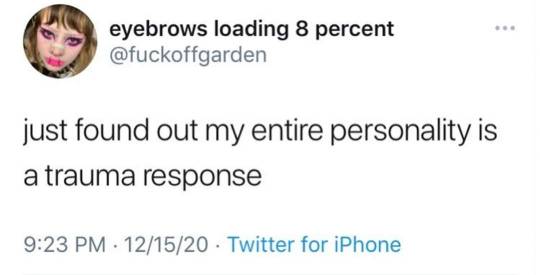Text
i wish sadness didn’t feel like agony. i wish i could feel a negative emotion without wanting to rip out my eyes.
7K notes
·
View notes
Text
“Stop making your disorder your personality”
Brother I have a personality disorder
4K notes
·
View notes
Text

𝐈 𝐡𝐚𝐭𝐞 𝐰𝐡𝐞𝐧 𝐩𝐞𝐨𝐩𝐥𝐞 𝐚𝐬𝐤 𝐦𝐞 𝐡𝐨𝐰 𝐈 𝐟𝐞𝐞𝐥 𝐛𝐞𝐜𝐚𝐮𝐬𝐞 𝐭𝐡𝐞𝐧 𝐦𝐲 𝐦𝐢𝐧𝐝 𝐠𝐨𝐞𝐬 𝐭𝐡𝐫𝐨𝐮𝐠𝐡 𝐭𝐡𝐢𝐬 𝐞𝐧𝐝𝐥𝐞𝐬𝐬 𝐯𝐨𝐢𝐝 𝐨𝐟 𝐞𝐦𝐨𝐭𝐢𝐨𝐧𝐬 𝐚𝐧𝐝 𝐈'𝐦 𝐞𝐢𝐭𝐡𝐞𝐫 𝐟𝐞𝐞𝐥𝐢𝐧𝐠 𝐞𝐯𝐞𝐫𝐲𝐭𝐡𝐢𝐧𝐠 𝐚𝐭 𝐨𝐧𝐜𝐞 𝐨𝐫 𝐧𝐨𝐭𝐡𝐢𝐧𝐠 𝐚𝐭 𝐚𝐥𝐥 𝐬𝐨 𝐭𝐡𝐞𝐧 𝐈 𝐣𝐮𝐬𝐭 𝐞𝐧𝐝 𝐮𝐩 𝐬𝐡𝐫𝐮𝐠𝐠𝐢𝐧𝐠 𝐚𝐧𝐝 𝐬𝐚𝐲𝐢𝐧𝐠
“𝐈 𝐝𝐨𝐧'𝐭 𝐤𝐧𝐨𝐰“
6K notes
·
View notes
Text
are you ever so extremely fatigued that you wanna cry
6-28-23
6 notes
·
View notes
Text
Trauma disorders
Post-Traumatic Stress Disorder (PTSD)
PTSD is one of the most well-known trauma disorders. It’s estimated to affect around 8 million U.S. adults in a given year. Individuals develop PTSD following a traumatic event. While it’s common for initial symptoms to begin in the days following a traumatic event, symptoms can even begin to surface months later. Symptoms can be grouped into four categories:
Intrusive thoughts about the event, including nightmares and flashbacks
Avoidance of anything that reminds you of the trauma
Behavioral changes such as insomnia, withdrawing from loved ones, and engaging in reckless or self-destructive behaviors
Cognitive disturbances like irritability, negative thoughts about self or others, and fear/paranoia
In order to receive a PTSD diagnosis, you must experience a certain number of symptoms from each category for over one month.
Symptoms of PTSD
People with PTSD experience a very distinct set of symptoms that can be grouped into different categories.
Re-Experiencing Symptoms
These include intrusive thoughts about a traumatic event, nightmares, and flashbacks. A flashback is a frightening and intense experience where an individual feels as if they are living through the trauma again.
Avoidance Symptoms
People with PTSD often seek to avoid all reminders of what happened. They may refuse to go to certain places, see certain people, or talk about what they went through. They try to push all thoughts of the event out of their mind, but flashbacks and nightmares can make this difficult.
Arousal and Reactivity Symptoms
PTSD often causes hyperarousal, a condition marked by heightened vigilance and reactivity. You may feel “on edge” constantly, as if you cannot relax, and get startled easily. Hyperarousal also causes insomnia, trouble concentrating, and outbursts of anger.
Cognitive Symptoms
People living with PTSD experience changes in the way they think and feel. They may become more irritable, anxious, and fearful. They also tend to have negative thoughts about themselves or the world. For example, you might believe the world is a dangerous place and no one can be trusted, or that you’re a bad person and are to blame for the trauma. This frequently prompts behavioral changes like withdrawing from family and friends or abusing alcohol and drugs.
Complex PTSD
When individuals are exposed to repeated or prolonged trauma, such as childhood abuse, they develop a slightly different condition known as complex PTSD (C-PTSD). This shares many similarities to post-traumatic stress disorder, but also has some unique symptoms including:
Poor emotional regulation, which manifests as outbursts of extreme emotions like rage and depression
Negative view of self
Trouble forming healthy relationships
Behavioral difficulties like substance abuse, impulsivity, and self-destructive actions
Detaching from self (depersonalization) or reality (derealization)
Forgetting the trauma
Losing core values and beliefs
Although some mental health professionals treat complex PTSD as a distinct condition, the Diagnostic and Statistical Manual of Mental Disorders (DSM) categorizes the symptoms under PTSD.
Acute Stress Disorder (ASD)
Acute stress disorder is very similar to PTSD, but is shorter in duration. ASD symptoms develop immediately after a traumatic event and last three days to one month. If symptoms persist beyond a month, the individual has developed PTSD.
Secondhand Trauma
Secondhand trauma is also known as trauma exposure response or secondary traumatic stress disorder. It results from exposure to the firsthand trauma of other people. Symptoms of secondary traumatic stress include:
A sense of hopelessness or helplessness
Feeling like you can never do enough to help
Hypervigilance
Guilt
Fear
Anger
Negativity/cynicism
Chronic fatigue
Secondhand trauma can happen to anyone, but it commonly affects professionals who work with trauma victims such as counselors, social workers, first responders, doctors, nurses and other healthcare workers.
Reactive Attachment Disorder (RAD)
Reactive attachment disorder occurs in children who cannot form stable attachments to their caregivers. If a child’s basic needs are not met or they are frequently placed with new caregivers, they are at increased risk of developing RAD. Symptoms may include:
Emotional withdrawal or inhibition
Lack of response to comfort from caregivers
Impaired emotional response to others
Limited ability to experience positive emotions
Episodes of irritability, sadness, or fearfulness, often without cause
Although rare, this condition can be devastating to a child’s normal development and may affect their lives into adulthood. However, treatment can help.
Disinhibited Social Engagement Disorder (DSED)
Children who were unable to form healthy attachments to their caregivers may develop disinhibited social engagement disorder instead of reactive attachment disorder. While these two conditions have the same roots, symptoms are completely different.
DSED causes children to exhibit culturally inappropriate behavior. This often takes the form of familiarity with strangers. Children with DSED feel no fear around strangers, and may even be comfortable getting into a car with someone they’ve just met. This disorder poses a serious threat to safety. Caregivers should seek immediate treatment for a child who displays this kind of behavior.
Adjustment Disorders
Adjustment disorders are usually temporary and triggered by stressful life events such as divorce, job loss, being diagnosed with an illness, or losing a loved one. Some people are able to cope with the stress of these situations on their own, but others need help from a doctor or mental health professional.
Symptoms of an adjustment disorder may include:
Frequent sadness or hopelessness
Crying often
Withdrawing from family and friends
Not enjoying your favorite activities and hobbies anymore
Lack of appetite
Insomnia
Neglecting your responsibilities at home or work
Having trouble focusing
Difficulty functioning in daily life
Suicidal thoughts or behaviors
If you notice some of these symptoms following a major event, talk to your primary care provider or a mental health specialist. Treatment for adjustment disorders is usually temporary. However, for chronic life events like an ongoing illness or relationship problems, you might need long-term treatment.
Other and Unspecified Trauma- and Stressor-Related Disorders
You might have some of the symptoms of a trauma disorder, but not meet the criteria for one of the recognized types. Or, you might not be able to provide enough information for a specific diagnosis. In these cases, professionals often make a diagnosis of “other or unspecified trauma- and stressor-related disorder.”
This diagnosis is not any less serious than other trauma disorders. People with other or unspecified disorders have a legitimate mental health condition that is diminishing their quality of life. Treatment can help you gain control over your symptoms.
561 notes
·
View notes
Text
oh
Abused children will sometimes dream of getting hurt really bad, getting terminally ill, being kidnapped or severely injured in some kind of an accident, because then they can dream of their parents finally caring about what is happening to them. Abusive parents often act like nothing that is happening to the child is ‘serious enough to care’, so the child fixes a fantasy of that one time when it would be serious enough to force them.
It enables the child to imagine their parents being concerned, scared for the child’s life, getting them to a hospital or simply being worried and loving and hopeful that the child will be alright, that they’ll stay alive. For the abused children, there’s often no other way to prove to themselves that their parents care, so they’ll fantasize about a scenario that would force their parents into a situation where they’d have to show care, they’d have to slip into action and to something immediately on the spot in order to save the child. It also enables a child to fantasize about their parent being kind, even if it’s out of fear that they’re losing the child. The child reassures themselves that their parents would care, in a life-or-death kind of situation at least.
If you have to imagine a life-or-death scenario in order to imagine your parents caring and being concerned, your parents are most likely abusive.
There’s another reason abused children will imagine all kinds of horrible things happening to them - things like being physically tortured, abandoned, kidnapped, violated, sold or exploited - and that’s because children are trying to think of a situation where their pain would be explained by real-life events. The child might be in so much pain, but since they’re convinced that they’re not abused, and they’re groomed to normalize and accept the abuse as ‘no big deal’ and ‘just being sensitive’, they can find no reason for their emotional turmoil. So, they wish they had something. ‘If only I was kidnapped and tortured, then it would be reasonable to feel this kind of pain, and everyone would acknowledge it and believe me’.
That’s a thought only someone who is already badly abused can have. Normal people don’t wish for severe trauma to happen, only to explain and acknowledge their feelings. The massive amount of trauma that explains those feelings is already happening, but the child is conditioned not to be able to acknowledge it or even see it as real; they’re used to their senses and experiences to be dismissed as nothing, so it’s impossible for the child to take themselves seriously, to acknowledge that they’re already being tortured.
These fantasies can also be over-the-top cruel, not because the children are being dramatic, but because the children have been told that only the most extreme, most traumatic, and most heavy to endure situations would ever be serious enough to be acknowledged. They’re being compared constantly to ‘those who have it worse’, so in their fantasy, they’re going to have it the absolute worst.
Dreaming of trauma is often a symptom of trauma. If you spent your childhood imagining horrible scenarios, and even hoping for them, it’s likely you already had it bad enough, and just wanted for other people to see and acknowledge it, and the imagined trauma was just something that would help that to happen. it’s possible that these fantasies are followed by some sort of guilt (what kind of person would hope for these things?), but it’s absolutely none of your fault. You were searching for acknowledgment and for your feelings to be something explainable, something other people would understand and admit as real. This was something denied to you, and it was making your pain worse for everyone to pretend you had no reason to feel it. You were not imagining it for the attention - you would only ever get negative attention for expressing such things anyway.
You were trying to make sense of the world that made no sense to you. You wanted to be heard and understood. You wanted to be cared about, and you wanted for others to take your pain seriously, which you had every right to. Life shouldn’t have been so awful for you that you had to imagine worst case scenarios as comfort story.
870 notes
·
View notes
Text
For those of us who are chronically suicidal, it can be hard to find a reason to continue, especially when the thoughts never seem to go away.
So, in case you need to hear this today, I’m proud of you for choosing to fight today and for all of the days you fought for before this. Don’t worry about tomorrow yet. Just focus on today. You can do this.
234 notes
·
View notes
Text
Skills you shouldn’t have to learn to survive yet child abuse forces you to:
moving around without making any noise
moving around the place without turning on the light
locking/unlocking doors in complete darkness
staying stoic in the face of screaming, threats, and violence
pretense of being calm even if in deep panic
perfect pretense of being fine even in the middle of breakdown
silent crying, crying without making any noise or even tears
doing physical work while crying or injured and not stopping
sensing when someone is angry or stressed because now they’re a danger to you
comforting and calming people down in desperate attemt to lower the amount of danger you’re in
recognizing a person by their footsteps, or a car by the noise it makes when turning to a stop
turning all injustices and anger inwards and making it into self hatred
hiding scars and injuries
expertly making excuses for marks or scars on yourself
dissociating in a second if there’s danger of new trauma
repressing mountains of trauma
surviving emotionally completely on your own
9K notes
·
View notes
Text
how to deal with a verbally/emotionally abusive mom where you have a awful relationship that'll seem okay and then like a switch goes to shit but you still live with them, on their insurance, no job, no license and no car
3-2-22
0 notes
Text
It's okay to:
feel sad
put yourself first
cry
outgrow people
talk about your feelings
re-make mistakes
struggle to accept help
take a break
say "no"
2K notes
·
View notes
Note
I feel like my bpd isn't valid bc I've never had that obvious trauma.
I mean my experiences were traumatic but it's not enough. Don't get me wrong I'm glad i handled it well enough, it just makes me feel like I'm faking it. I don't understand how i developed a personality disorder and why.
Could it be I'm spoiled or something?
Trauma is trauma. There's no standard. If two people are drowning, we don't tell one there's isn't as bad because their water wasn't as deep. We all question ourselves and think it wasn't traumatic enough, think we're faking, it comes with the territory. You are not spoiled, you are existing in a gatekeeping world. You are valid, no matter the degree that you perceive your trauma. ❤
66 notes
·
View notes

